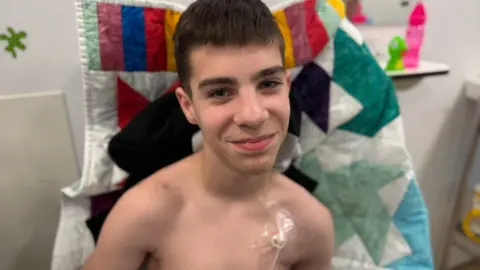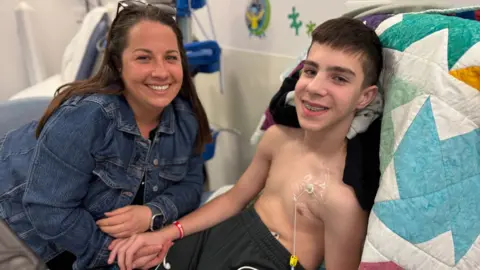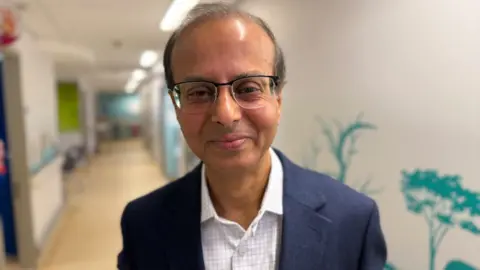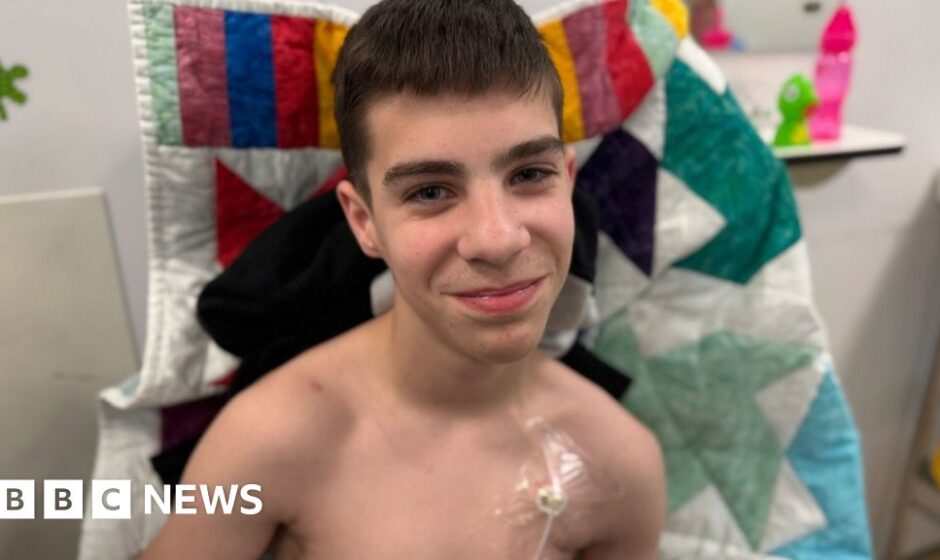BBC News, Essex
 Steve Hubbard/BBC
Steve Hubbard/BBCLike most teenagers his age, Finley is given a cake every year to celebrate his birthday, but he can never eat it – or any other food. If he did, he would bleed internally.
The 14-year-old’s digestive system cannot tolerate lipids – fatty compounds or oils which are found in foods – so he has them injected directly into his heart.
The treatment is a six-hour process which he has undergone every week since he was four years old, and over the past year it has increased to twice a week as he has grown.
Finley’s case is so rare that doctors have considered presenting it to a medical journal, as they believe he may be one of the only people whose body reacts to lipids in this way.
Dr Manas Datta, a consultant paediatrician at Broomfield Hospital in Chelmsford, Essex, who has treated Finley since he was born, said it was “horrific” seeing how Finley’s body responded to food.
“Even when he was on breast milk, he was reacting,” Dr Datta told the BBC.
“We had never seen this type of case before – I remember many days where Finley came to the hospital so unwell.”
 Family photo
Family photoFinley, from Battlesbridge, Essex, underwent more than 20 operations at Great Ormond Street Hospital in London as doctors tried to understand his condition.
His mum, Rhys, 37, felt her son had been a “guinea pig” due to “trials and errors”, and it had been “a lightbulb moment” when doctors finally worked out how to treat her son.
“It’s heartbreaking at times – people don’t see what Finley goes through day-to-day,” she said.
“They see the happy, chirpy young man, but psychologically he goes through a lot.”
Rhys said she does not try to hide the sociable aspect of food from her son.
“He’s always helped cook, we always go out to restaurants, he’s always had a birthday cake,” she told the BBC.
“He might not be able to eat it, but he’s had the same normality in that respect as everybody else.”
Finley, who is also autistic, said the look and smell of food does not make him hungry or feel like he is missing out.
“Having my feed is all I know, so I just see other people eating and it doesn’t bother me,” he added.
 Steve Hubbard/BBC
Steve Hubbard/BBCFinley receives a lipid infusion via a portacath, or tube, which enters his chest and links directly to the central vein in his heart.
“We have to bypass the gastro-intestinal tract completely,” Dr Datta said.
“Not only the fat, but he even cannot tolerate the normal carbohydrates and proteins as well,” he added.
Finley receives carbohydrates and proteins – along with vitamins, minerals and electrolytes – three times a day into his stomach via a different tube.
“I can’t remember when I had [the infusion] first because it’s just my life now – I can’t really escape it,” Finley said.
“There isn’t a name for what Finley has” said Rhys, adding her son called his condition “Finley-itis”.
“There’s no-one else that we know that has the lipid element infused directly.”
“We are actually thinking about reporting this case to some sort of journal because it’s such a rare condition,” Dr Datta said.
The hope is that Finley will be able to eventually do infusion treatments at home, instead of travelling to Broomfield Hospital twice a week.
“There might be a time that he is able to tolerate fat,” Rhys said, “but if not, we just carry on with what our ‘normal’ is and go from there.”
 Steve Hubbard/BBC
Steve Hubbard/BBCFinley has plans to abseil down a tower block at Southend Hospital on 16 May to raise money for the Mid and South Essex Hospitals Charity.
“The building is 154ft (47m) – it’s a bit high, but I feel like I’ll be all right,” Finley said.
“The hospital and all the [staff] have given me care through my life, and I just wanted to give back and raise money for them to help other people.”
Finley’s mum – who completed the same abseil on Finley’s behalf a couple of years ago as he was too young – said her son was “remarkable”.
“He’s the most lovable little boy who wants to help other people because of what he’s gone through – I’m so proud of him.”
#Essex #teenager #left #unable #eat #due #rare #digestive #condition



